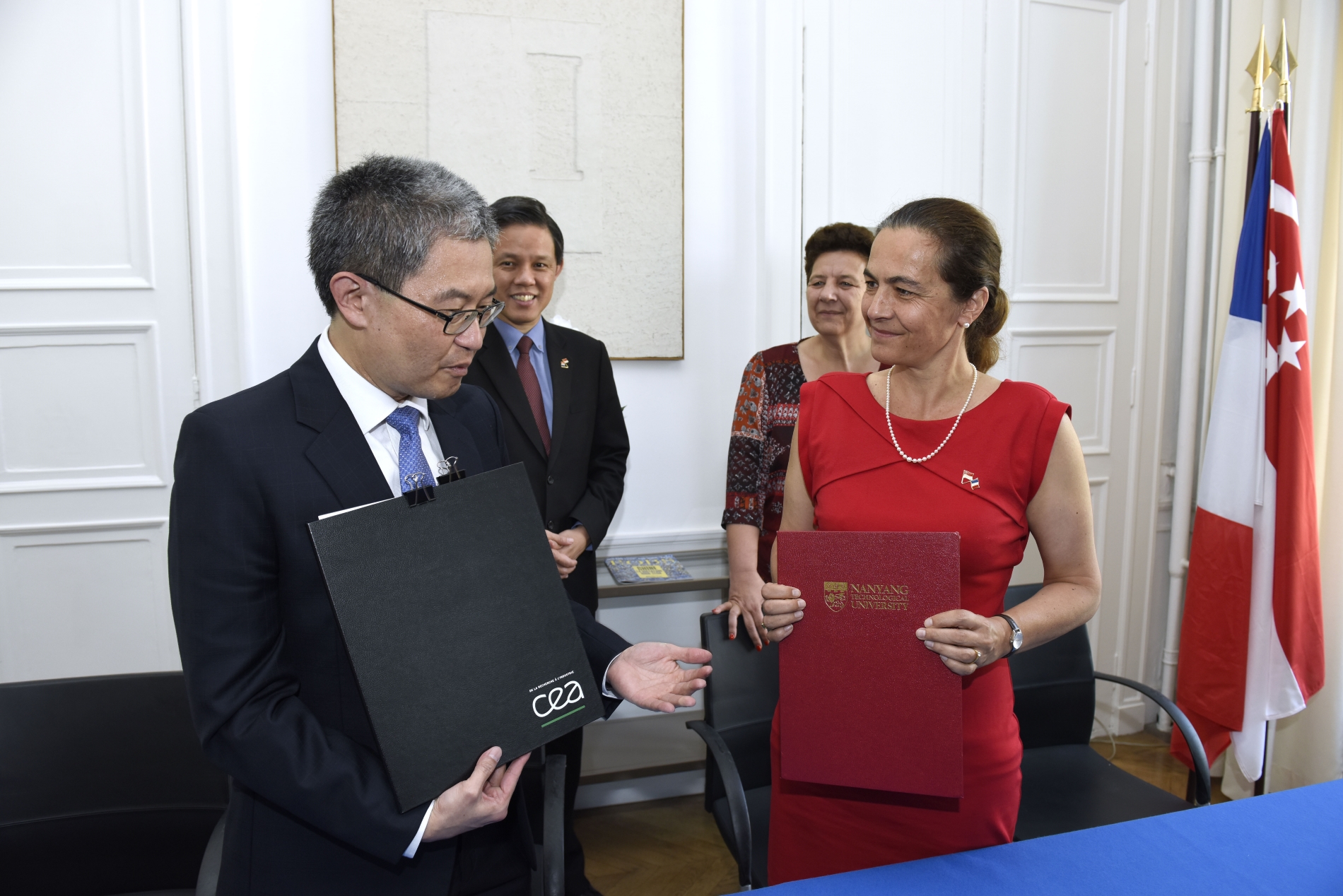The agreement which will see the setting up of the NTU-CEA Joint Lab in Singapore, was formalised this week to coincide with Singapore Prime Minister Lee Hsien Loong's visit to France at the invitation of French President Emmanuel Macron to be a Guest of Honour at the French National Day parade on July 14.
Signifying Singapore's strong ties with France and the 2018 France-Singapore Year of Innovation, the NTU-CEA Joint Lab will focus on four research thrusts that include recycling and recovering materials from e-waste such as discarded lithium ion batteries and printed circuit boards.
Located in NTU's 200-hectare campus, the joint lab will also look at developing advance separation and extraction processes of e-waste that are less energy intensive and less toxic than current methods.
With a strong focus in promoting sustainable industry processes, the joint lab's aims are in line with NTU's focus in sustainability research to develop industry-driven solutions for a greener future.
NTU President Professor Subra Suresh said, "E-waste is becoming the world's fastest-growing trash stream as consumer electronics such as mobile phones constantly get replaced. The NTU-CEA Joint Lab will devise more efficient processes to recycle e-waste so that materials, such as rare earth metals from used electronics, can be safely extracted and reused. The development of sustainable technologies is a key focus for NTU, and the university strives to ensure that research ideas nurtured at the lab are translated into practical, scalable and industry-driven solutions that will benefit society."
Professor Lam Khin Yong, NTU's Vice President for Research, said, "NTU has collaborated with the CEA over the past five years on topics ranging from green buildings to sustainability research. This project will exploit the synergies between the CEA and NTU's in topics related to the circular economy and will accelerate the transition from basic research to practical field deployments that will bring economic value and will also contribute towards a sustainable future."
The CEA Chairman Dr. François Jacq, said, "The CEA has been collaborating with NTU since 2012 on material science. Today, we are making a decisive step with the creation of the NTU-CEA joint lab and the implementation of the SCARCE Project. More than fifteen of the CEA's top researchers will make extended stays in Singapore to strengthen this collaboration and leveraging on the CEA's world-renowned expertise and technologies in material recycling and waste management. Together with NTU we will address solutions to e-waste management challenges with the perspective of translating our R & D and innovation into high value-added industrial products and processes. Moreover, it is emblematic that the signature of the agreement takes place during the 2018 year of Innovation France-Singapore. For the CEA, this is the start of what we foresee as a long-term and fruitful collaboration with Singapore, especially when keeping in mind that this joined laboratory is our first one implemented abroad."
The NTU-CEA Joint Lab will operate under the auspices of the Singapore CEA Alliance for Research in Circular Economy (SCARCE).
SCARCE will look into developing innovative recycling technologies that involves sorting, dismantling, and recovering materials that can be re-used in an energy-efficient and environmental benign way.
The National Environment Agency (NEA) of Singapore, NTU and the CEA will be committing a total of S$20 million (€ 12,57 million) to support the setup of SCARCE, and its initial tranche of projects.
SCARCE is the first project that has received funding from NEA's Closing The Waste Loop research funding initiative. The S$45 million Closing The Waste Loop research funding encourages collaborations among institutes of higher learning, research institutes and private sector partners, to develop technologies and solutions to tackle challenges posed by increasing waste generation, scarcity of resources and land constraints for waste management.
Mr Ronnie Tay, Chief Executive Officer of NEA said, "Through the funding of SCARCE, NEA is committed to supporting initiatives that recover resource from waste and keep recovered materials in the economic cycle. Technology is a key enabler to closing our waste loop, and we hope that this collaboration will yield fruitful outcomes, as we continue efforts to reduce our carbon footprint and minimise environmental impact, while recovering value from waste."
Developing sustainable solutions
The NTU–CEA Joint Lab will focus on four research thrusts that include recycling and recovering materials from:
- lithium ion batteries;
- silicon-based solar panels;
- printed circuit boards (PCBs) from discarded consumer electronics; and
- toxic plastics in e-waste such as brominated plastics which has flame retardants to meet fire safety standards.
NTU and the CEA researchers will also address issues faced by current extraction methods of precious metals from lithium ion batteries, solar panels and PCBs which consumes large amounts of energy and uses strong acids.
To overcome such challenges, the joint lab will explore advanced novel separation and extraction processes such as using environment-friendly solvents (e.g. organic liquid salts) for dissolution and extraction of selective metals.
The partnership will also explore the use of activation means in combination with chemical reactions to aid the dissolution of materials and also study the use of bacteria and fungi species to extract metals and toxic elements from recyclable materials.
Besides metals, recycling technologies developed may also be applied to plastics, wood, and building materials.
With the CEA's world-renowned expertise in metal extraction and materials recycling with extensive industrial deployment, and NTU's excellence in R&D translation and innovation in environmental sustainability, this collaboration stands to boost local R&D capabilities in e-waste management and recycling.
